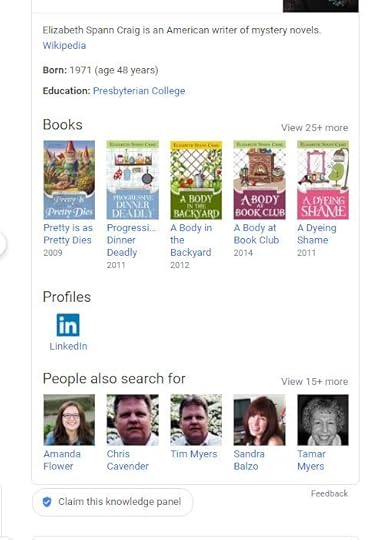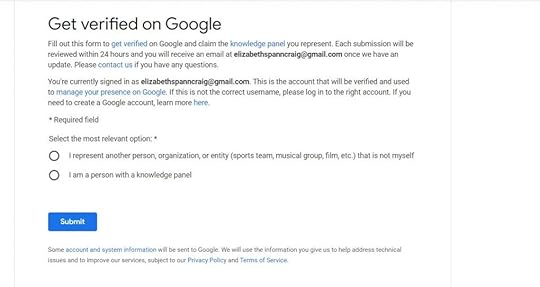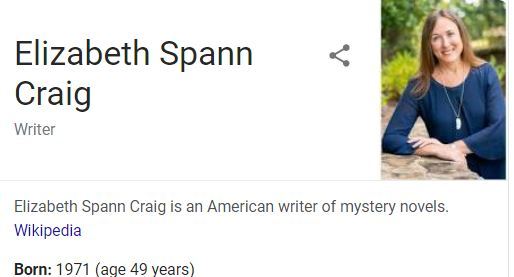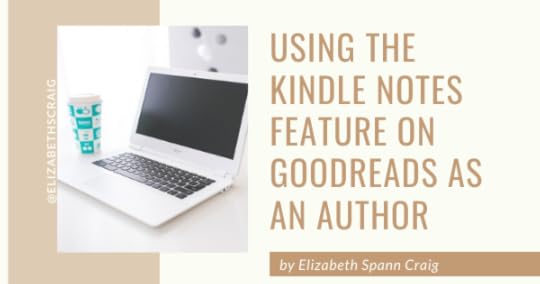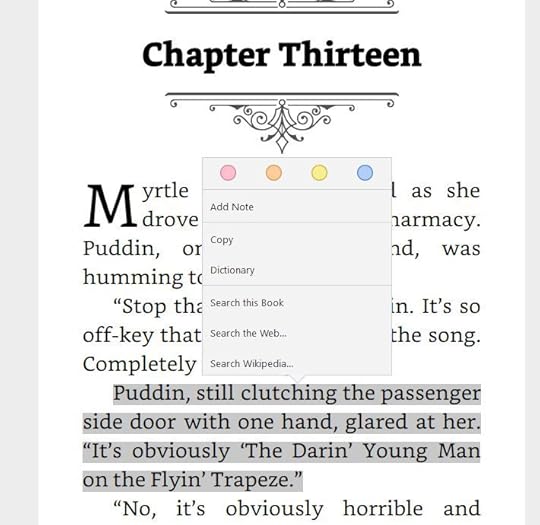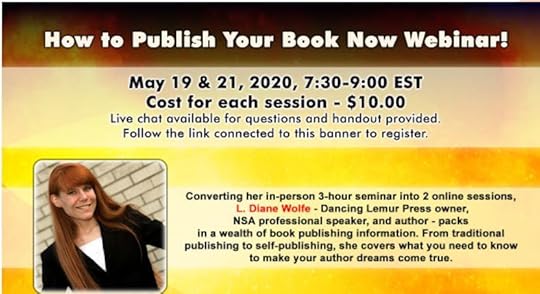Riley Adams's Blog, page 50
June 14, 2020
Writing Real-Life Historical Characters
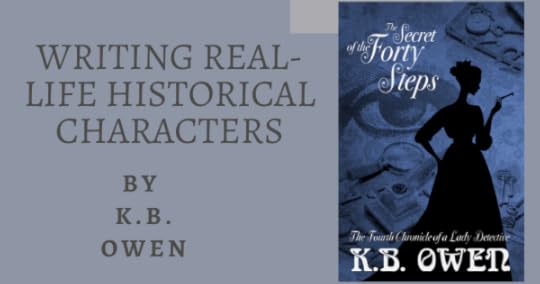
By K.B. Owen, @ kbowenwriter
Have you ever thought about adding a famous historical
figure to your story? After all, it’s been done successfully by the likes of Stephanie
Barron, Anne Perry, Sue Wittig Albert, Shelley Noble, Margaret Frazier, and many
others. What’s not to love about seeing kings, dukes, inventors, famous
authors, musicians, movie stars—the list goes on—come to life on the page?
But, to paraphrase Jeff Goldblum’s character in Jurassic Park, just because you can,
doesn’t mean you should. There are a
few downsides. For one thing, it involves more extensive research—combing
through diaries, letters, newspaper accounts, and more. Also, you’ll want to be
careful in your portrayals of historical figures. There could be descendants
who might object to you characterizing beloved great-great-great-Uncle Henry
as, say, a philanderer (even if true). Nobody wants a libel suit.
But let’s assume, for the purposes of this post,
that you want to take the plunge. I say…go for it! The possibilities are exciting,
and in my opinion the end result is worth the extra work. Here are my tips for
making it easier.
First, decide in advance what kind of time you
want to put into research, and adjust your character’s involvement accordingly.
In my lady Pinkerton series, the historical figure of William Pinkerton, my
protagonist’s boss, is an important stepping stone to her getting a case. I use
him sparingly, however. He’s more of a launching point to provide context for
the story, so I only needed to research some basics about him, and a bit more regarding
Pinkerton detective procedure.
Major characters require more in-depth research,
however, which brings me to the importance of…
Choosing someone who’s the right fit. The first
instinct for many authors is to be guided solely by the famous person’s significance
to the story’s historical moment. That’s a major requirement, sure, but I
consider two additional factors: 1) what background information I can find, and
2) their personality, especially in the context of my protagonist (for those
looking to write the historical figure as
the protagonist, well…that’s a whole different post).
Let me illustrate with two figures I used recently.
In THE CASE OF THE RUNAWAY GIRL (a story set in early 1887), I wanted a
backdrop that plunged my female detective in a “fish out of water” situation. I
settled on the old-boy backroom politics of late-19th century Washington,
DC, a place rife with ruthless industrial tycoons who greased a lot of palms to
get what they wanted. High stakes, and definitely a challenging environment for
my lady Pinkerton to navigate.
Moving on to my historical figure…I chose an Illinois senator, Shelby Moore Cullom. By all accounts he was a man of integrity dealing with a broken system, and yet managed to get the Interstate Commerce Act (ICA) signed into law.

Many other people had been involved in the passage
of the ICA, and I consider several alternative figures. What finally sealed the
deal for me was finding Cullom’s extensive memoir, Fifty Years of Service, which included speeches and great insider
details. I ended up mining it for turns of phrase and snatches of overheard
arguments (my sleuth listens at doors, of course!).
On the other hand, my decision to use newspaper magnate James Gordon Bennett in my new release, THE SECRET OF THE FORTY STEPS, was based mostly on his personality. He’d summered in Newport (the setting I’d decided upon) during the crucial time period, so I’d cleared my first requirement. In terms of personality, he was a writer’s dream come true—powerful, excessively wealthy, shrewd in business, a flamboyant spender, and an avid sportsman who played polo, tennis, and raced yachts. Real-life accounts of him were fiction gold—his drunken faux-pas (once, while inebriated, he urinated in the fireplace…some say it was the piano…in front of his soon-to-be-ex-fiancee’s family), his crazy wagers (he dared his friend to ride his polo pony through the Newport Reading Room, which of course he did), and his hedonistic lifestyle (a dairy cow was kept in a special stall on his yacht so he’d have fresh milk and butter every day when cruising at sea).
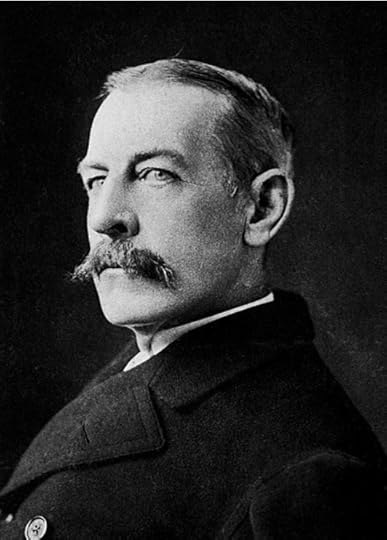
Such a personality as Bennett’s provided a great
foil for my protagonist. As the other characters fawned over this Colossus of
upper-class society, my lady detective—not
awed, which annoyed him no end—had to maneuver around the impediments he tossed
in her path. She even managed to put him in his place a few times. (I hope
folks get as much of a kick out of reading those parts as I did in writing
them. *wink*).
There are, of course, other ways to go about
incorporating historical figures—every author’s process is different. These are
the basics that work for me. I hope they’ll be helpful for you, too!
Have you thought about using a figure from history
in your story? What factors would you consider in making your choices? I’d love
to hear your thoughts.
Happy writing,
Kathy
Website: https://kbowenmysteries.com
Facebook: /kbowenwriter2
Twitter: @kbowenwriter
Instagram: @kbowen_mysteries
THE SECRET OF THE FORTY STEPS

The fourth chronicle of a lady detective
Money, love, and murder in 1880s Newport high society…
Pinkerton detective Penelope
Hamilton is summoned to fashionable Newport to investigate the two-year-old
death of a wealthy matron. Did she fall from the Cliff Walk’s Forty Steps in
the middle of the night, as was presumed, or was she pushed by her much-younger
husband?
The case is personal this time,
since Pen’s client is her own mother—breaking her near-decade of silence—and
the man under scrutiny is to marry Pen’s cousin in a week’s time.
The lady detective discreetly
enlists the help of a local, but the inquiry quickly unravels when he turns up
dead. To make things worse, Pen’s identity as a Pinkerton is uncovered by
Newport’s most prominent summer resident, whose complaint to her boss brings
Pen’s estranged husband and fellow Pinkerton, Frank Wynch, to Newport.
With her cousin’s wedding day nearly here and no
answers yet, Pen has no choice but to accept Frank’s help while dodging his
romantic overtures. Nothing like a little danger to heighten an already-fraught
relationship, as they work to expose a desperate adversary…who could prove
deadly to them both.
Available at these online retailers:
Tips for Writing Real-Life Historical Characters by @kbowenwriter :
Click To Tweet
The post Writing Real-Life Historical Characters appeared first on Elizabeth Spann Craig.
June 13, 2020
Twitterific Writing Links
by Elizabeth S. Craig, @elizabethscraig
Twitterific writing links are fed into the Writer’s Knowledge Base search engine (developed by writer and software engineer Mike Fleming) which has over 56,000 free articles on writing related topics. It’s the search engine for writers.
Have you visited the WKB lately? Check out the new redesign where you can browse by category, and sign up for free writing articles, on topics you choose, delivered to your email inbox! Sign up for the Hiveword newsletter here.
Business / Miscellaneous
Authors release their figures to illustrate pay disparities in the industry:
Friends Don't Let Friends Use Vanity Presses: @JohnDoppler @IndieAuthorALLI
8 Ways to Sell Self-Published Books Locally: @Bookgal
Calculate Your Author Royalties Faster and Easier: @MichaelLaRonn
Conferences and Events / Miscellaneous
Industry Notes: Translator Duncan Lien Wins 2020 Gutekunst Prize: @Porter_Anderson @pubperspectives
Creativity and Inspiration / Goal setting
11 Quick Tips for Setting Simple But Impactful Writing Goals: @MegDowell
Creativity and Inspiration / Inspiration / Reading as Writers
Why Reading Bad Prose Can Make You a Better Writer: @lqtang @ReedsyHQ @A3writers
Seven Fictional Con Artists and the Communities They Swindled: by Steven Wright @CrimeReads
8 Stories You Don’t Have to Understand to Enjoy: @use_theforce_em @tordotcom
Six Stunning Fantasies for Nature Lovers: @EmilyBeeMartin @tordotcom
35 books about race, recommended by black Portland writers: @ORAmyW @Oregonian
10 Must-Read Crime-Fighting Duos: @Darynda @CrimeReads
7 Transformational Books to Read in Your Treehouse: by Jonathan Stone @CrimeReads
24 New and Forthcoming Books That Celebrate Black Lives: @jbakernyc @ElectricLit
Twelve books that give context to current protests [reading list]: @OUPAcademic
5 Books by Black Authors to Read Today: by Alice Sudlow @write_practice
Creativity and Inspiration / Productivity / Fitting in Writing
Must-Haves for 10 Minute Novelists: @10minnovelist
10 Ways To Write 1000 Words By 9AM: by Rafal Reyzer @Bang2write
How to Get Some Writing Done: Discipline vs. Enthusiasm: @KMWeiland
7 step training plan for running a personal writing sprint: @beprolifiko
10 Ways to Keep Writing When You’d Much Rather Do Other Things: @MegDowell
Creativity and Inspiration / Writing Life
How to Organize Your Home Office: @rondakaysen @michellehiggins @lithub
Productivity vs. Chaos: How to Hit a Balance: @cathyyardley @WriterUnboxed
Concentration: 22 ways to help you focus on writing: @wearearticulate
Stay-at-Home Tips & Apps for Maintaining (Some) Sanity: @RoniLoren
12 Simple Strategies for Writing While Anxious: @MegDowell
How to Boost Focus ahead of a Writing Session: by Rosie O’Neill @LiveWriteThrive
What Does it Take to Be a Writer? 4 Traits You'll Need to Succeed: by Joslyn Chase @write_practice
Preparing to Write a Book is like Preparing to Cross An Ocean Alone: @readallday @WomenWriters
Being productive can be self-care: @NathanBransford
Dismantling the Stigma of Mental Illness: @jeffgarvinbooks @DIYMFA
Find What You Need and Write What You Can: @annkroeker
Jericho Brown and Nikky Finney on Black Lives Matter and Bearing Witness: @jerichobrown @lithub
Genres / Historical
Historical Fiction: Discover New Truths in the Past: @EliotPattison @WritersDigest
Genres / Horror
Literary and film manifestations of the Gothic: @pmeinertzhagen @Prof_Nick_Groom @_SublimeHorror by Katariina Kottonen
Genres / Memoir
Before You Write Your Memoir: 10 Musts That Can't Go Ignored: @shaylaleeraquel
Genres / Picture Books
Revising Their Way to a Debut: @WritersRumpus
Genres / Science Fiction
Confronting the Default: Portraying Homelessness in Science Fiction and Fantasy: @stevetoase @tordotcom
Genres / Screenwriting
Scriptnotes: Clueless, Transcript: @johnaugust
Genres / Short Stories
An Expansive Mini-Guide for Structuring Your Short Story: @JunetaKey @TheIWSG
Promo / Book Descriptions and Copywriting
How and Why to Write Your Back-Cover Synopsis Early: @writingstorm
Promo / Book Reviews
Tips for Navigating Negative Reviews and Critiques:
Promo / Miscellaneous
The Psychology Behind Effective Marketing: @DanBlank
Promo / Newsletters
7 Ways to Be Consistent with a Weekly Email Newsletter: @MCStarbuck @shaylaleeraquel
Promo / Platforms
Grow a More Fertile Author Platform: @EldredBird
Promo / Speaking
The Author’s Experience: How to Visit with Book Clubs (Virtually and In-Person): @JillSantopolo @PRHDigital
Promo / Websites
This is How to Safely Choose Colors for Your Author Website: @ThDigitalReader @BadRedheadMedia
Publishing / Miscellaneous
Ten Publishing Things That Will Never Be The Same: by Richard Charkin @pubperspectives
Coronavirus Impact: Scholastic Adjusts Its Summer Reading Program: @Porter_Anderson @pubperspectives
Coronavirus Worklife: Midas PR's Jason Bartholomew: After the ‘Blind Panic': @Porter_Anderson @jaysambart @pubperspectives
US ‘Publishing Day of Action' Calls Out Book Industry's Racial Disparities: @Porter_Anderson @VersoBooks @adevries18 @meg_r @LEEandLOW @rgay @pubperspectives
Black British authors top UK book charts in wake of BLM protests: @alisonflood @GuardianBooks
#PublishingPaidMe reveals stark disparities between payment of white writers and writers of color: @JonnyDiamond @jesmimi @nkjemisin @lithub
Not Until We Get a Turn: Retellings, Tropes, and Who Gets To Tell Stories: @KalynnBayron @tordotcom
Publishing has ignored and pigeonholed black authors for too long: by Magdalene Abraha @GuardianBooks
Publishing / News / International Publishing
Coronavirus Worklife: Rakuten Kobo's Michael Tamblyn: Lessons from the Contagion: @Porter_Anderson @pubperspectives @mtamblyn @kobo
Coronavirus: Bodour Al Qasimi Opens Emirates Publishers Emergency Fund: @Porter_Anderson @Bodour @pubperspectives
In Istanbul: A New Illustration Agency Focused on Timely ‘Book Projects': @Porter_Anderson @pubperspectives
China Bestsellers April 2020: A Watchful Market, a Reawakening Chart: @Porter_Anderson @pubperspectives
Writing Craft / Beginnings
WIP Diagnostic: Is This Working? A Closer Look at Point of View and Internalization: @Janice_Hardy
Writing Craft / Common Mistakes
Common Writing Mistake: Writing Yourself Into the Story: @KelsieEngen
Writing Craft / Dialogue
Should I use contractions in dialogue? @LouiseHarnby
Writing Craft / Diversity
How Not to Write a Book about a Minority Experience: @tajjaisen @walrusmagazine
Opinion | How White Crime Writers Justified Police Brutality: @johnsfram @nytopinion
Writing Craft / Drafts
First Draft, Second Draft, or Editing: How to Know What Draft You’re On: by Callie Sutcliffe @write_practice
Writing Craft / Literary Devices
What Is ‘Theme' in Writing? @MoonlightingWri
Writing Craft / Miscellaneous
What’s a Chapter? And How Long Should it Be? By Dario Ciriello
Two ways to add emotional weight to your stories: @MBjorkWrites
Is Relatability Actually Important? by Oren Ashkenazi @mythcreants
Storytelling Lessons in 60 Seconds or Less: @jamesscottbell @killzoneauthors
Are Writers Being Taught To “Dumb-Down” Their Technique For The Reader? @marionatpath @WomenWriters
Storytelling for Authors: @YvonneOrtega1 @EdieMelson
Lyrical Writing: 5 Tips for Crafting Richer Prose: @nownovel
What Authors Need To Know About Writing Brits: @FredBobJohn @standoutbooks
How to avoid Sagging-Middle Syndrome: @AuthorMarilene
Is “Show, Don't Tell” the Most Despicable Writing Advice Ever? @lisadaily
Writing Craft / Pre-Writing / Plotting
Guide To Plot Development: @writingandsuch
Writing Craft / Pre-Writing / Story Concept
Going from Inspiration to Inception: by Staci Troilo @StoryEmpire
Writing Craft / Revision
7 Mistakes to Weed Out When Editing Your Writing: @DaveChesson @IndieReader
Tips for Reviving an Abandoned Project: @mindofkyleam @ProWritingAid
Writing Craft / Revisions / Critiques
Ready for the red pen – how to prepare for comments on your book manuscript: @Roz_Morris @peterselgin @CarolLovekin @MarciaAButler @matosman @ClaireFuller2
Writing Craft / Settings and Description
How to Write Great Character Descriptions for Your Novel: @createastorylov
Uncategorized
The Hot Sheet: Industry Newsletter for Writers (30 Day Free Trial) from @JaneFriedman:
The Top Writing Links From Last Week Are On Twitterific:
Click To Tweet
The post Twitterific Writing Links appeared first on Elizabeth Spann Craig.
June 7, 2020
Navigating Negative Reviews and Critiques
 by Elizabeth S. Craig, @elizabethscraig
by Elizabeth S. Craig, @elizabethscraig
I love writing and sharing my stories with readers. I was the same when I was a kid, foisting grammatically-incorrect short stories on my parents' unsuspecting company. One thing has remained the same from both back when I was a kid and now…it stings to get negative feedback, whether it's a teacher at school, a critique group, or a reader review. But now, like then, it didn't stop me. I always remember it (and, likely, on some level resent it), but it doesn't hold me back. Most of the time it can actually help me improve.
Here are some tips for dealing with bad reviews:
Don't react…at least online. The worst thing to do is engage. It can be tempting. I've had negative reviews because the book arrived damaged at a reader's home via shipping. It's just better to leave it alone.
Keep it in perspective. Lots of people have read your book and enjoyed it. Plus, negative reviews show a book is being widely read and it's not just family members reading your book and reviewing it.
Take what's useful from a negative review or critique for the future. I can't tell you how many times I've read a bad review and made a note on an outline to address that very point in the future. Frequently, negative reviews can really inform future writing. Of course, negative critiques or edits are better because we have the opportunity to make changes before the book is published.
De-stress. No matter how well you handle a bad review, it's going to stress you out on some level. I always try to take the time to actually take care of myself…take a walk, listen to music, read a good book. It does help.
Keep a folder of positive reviews and reader emails. This is probably my favorite tip of all. Keep a folder stuffed full with your positive reviews and glowing reader emails. When you've read some negative reviews (or if you're just having a rotten writing day for any reason), go back and take a look.
Remember to celebrate small successes. This is one of those things that's hard for me, but that I'm trying to do better with. So often I pay attention to areas I need to fix and don't remember to celebrate the weeks I hit my goals or the books I finish. If we get too inured to the negatives, it can be hard to spot the positives.
For further reading on dealing with negative reviews and critiques, see:
How to Handle a Bad Critique by Kelly Hart
Prepare for the Critics, the Nasty Ones by Beth Hill
Kill Me Now–What Do I Do About a Negative Review by Roz Morris
Bad Reviews–6 Reasons to Be Glad You Have Them by Anne R. Allen
Do you ever get negative reviews? How do you handle them?
Navigating Negative Reviews and Critiques:
Click To Tweet
Photo on VisualHunt.com
The post Navigating Negative Reviews and Critiques appeared first on Elizabeth Spann Craig.
June 6, 2020
Twitterific Writing Links
by Elizabeth S. Craig, @elizabethscraig
Twitterific writing links are fed into the Writer’s Knowledge Base search engine (developed by writer and software engineer Mike Fleming) which has over 56,000 free articles on writing related topics. It’s the search engine for writers.
Have you visited the WKB lately? Check out the new redesign where you can browse by category, and sign up for free writing articles, on topics you choose, delivered to your email inbox! Sign up for the Hiveword newsletter here.
Business / Miscellaneous
Make a writing career out of your hobby or day job: @Roz_Morris
How To Sell Your Books In Bulk And Make More Money As An Author: @wealthy_barber @thecreativepenn
How to Get Book Blurbs: @Gabino_Iglesias @LitReactor
How to Find a Poetry Editor in 5 Essential Steps: @ReedsyHQ
How to Survive Your First Year as a Full-Time Author: @sacha_black @IndieAuthorALLI
Conferences and Events / Miscellaneous
Programming Opens Today from Madrid's Readmagine and Paris' EDRLab: @Porter_Anderson @pubperspectives
The UAE's Sheikh Zayed Book Award Opens Submissions for 2021: @Porter_Anderson
Hay Festival Serves 490,000 Streams; Costa Awards Open for Entries: @Porter_Anderson @pubperspectives
Vietnam's Liberal Publishing House Wins IPA's 2020 Prix Voltaire: @Porter_Anderson @pubperspectives
PEN America: Chinese Essayist Xu Zhiyong Wins Barbey/Freedom To Write Award: @Porter_Anderson @PENamerica @pubperspectives
Creativity and Inspiration / Inspiration
Time to Write: 3 Ways To Prime the Pump: @SueBEdwards @womenonwriting
Inspiration Boards: @MarciaMeara @StoryEmpire
Mythic Storytelling: Five Books on Tarot for Writers: @MelanieMarttila @DIYMFA
Creativity and Inspiration / Inspiration / Reading as Writers
A Podcast for Agatha Christie Fans: @allaboutthedame h/t @JaneFriedman
Use The Story Grid Scene Analysis Template to Read With Purpose: @abigailkperry @DIYMFA
Sleeps With Monsters: What to Read When the Whole World’s Falling Apart: @hawkwing_lb @tordotcom
How Pop Culture Got It Wrong With Dissociative Identity Disorder: @meifung100 @CrimeReads
Legal Thrillers for Literary Snobs: @Michaelakahn @CrimeReads
Reading Like a Writer: @emma_darwin
Creativity and Inspiration / Productivity / Writer's Block
Identifying a Loss of Momentum vs. Writer’s Block: @Janice_Hardy
Creativity and Inspiration / Writing Life
All the Things You’ll Worry About: The Blank Page: @MegDowell
10 Things Writers Should Say to Each Other More Often: @MegDowell
Spot Your Habits and Build Your Skills: @ProWritingAid @DIYMFA
10 Ways to Support Your Writing Career, Even When You're Not Writing: @aprildavila
How to calm your anxiety (so you can write again): @pubcoach
Writing Things You’ll Never Publish Isn’t Wasteful — It’s Essential: @MegDowell
No pubs, no kissing, no flying: how Covid-19 is forcing authors to change their novels: @alisonflood @GuardianBooks
The Long Tradition of Writers Needing Ritual: @amitavakumar @lithub
The Myth of Perfect Writing Locations: @eawright @WomenWriters
5 Ways to Support an Author’s New Book: @tmtysinger
Why Does Writing Matter? Why You Should Write When You Worry it Doesn't: by Sue Weems @write_practice
The Importance of Fluidity for Writers: @nancyjcohen @FloridaWriters1
Coming Up With Ideas Is the Easy Part: @MegDowell
10 Things That Will Probably Tempt You to Quit Writing: @MegDowell
World Shift in Publishing: @johnpwriter
You’ll Do Your Best and Worst Writing When You Dare to Improvise: @MegDowell
What is writing talent? A bookseller and author-publisher discuss: @Roz_Morris
How to continue working from home: @pubcoach
So Much Time, So Little Writing: @Peter_Rey_
Write through the Crisis: Journal to Improve Your Health: @SamanthaShad @FloridaWriters1
Processing Your Process: @PhilAthans
Genres / Fantasy
How Can Fantasy Stories End Without a Big Battle? by Chris Winkle @mythcreants
Genres / Historical
Guide To Writing Historical Fiction: @writingandsuch
Genres / Miscellaneous
Finding Humor in Food Writing: @FinishedPages @womenonwriting
Genres / Mystery
The Rise of Australian True Crime Podcasts: @SaraJFoster @CrimeReads
An 18-Step Guide to Homicide Investigations: @LeeLofland
Genres / Picture Books
Writing for Very Small Children: Finding the Story: @AmyMJones_5 @WritersDigest
Genres / Science Fiction
Five Contrived Legal Conflicts in Speculative Fiction: by Oren Ashkenazi @mythcreants
Genres / Screenwriting
Script Analysis: “Joker” — Part 1: Scene-By-Scene Breakdown: @GoIntoTheStory
How Screenwriters Can Benefit From The Rule Of Three: @marksevi @CreativeScreen
Promo / Ads
BookBub for Authors: Complete Guide & BookBub Review: by Scott Allan
Promo / Blogging
How to Not Waste Your Valuable Time When Submitting Guest Blog Posts: @ThDigitalReader
Interview with Online Book Tour Organizer Mason Canyon: @MCBookTours @yolandarenee
Promo / Crowdfunding
Kickstarting Your Indie Author Career – with Nicholas Kotar: @SelfPubForm
Promo / Metadata
Keywords in Your Book Description: Do They Help? @DaveChesson
Promo / Miscellaneous
Claiming Your Knowledge Panel on Google:
Writing Effective Calls-to-Action: Tips for Authors to Convert Readers: @TakticalDigital @IngramSpark
8 Things to Get Your Book Noticed on Amazon: @Bookgal
Promo / Platforms
The Ultimate Guide to Building A Solid Author Platform: @IndieAuthorALLI
Promo / Websites
10 Questions to Ask Your Website Designer: @PaulineWiles
Publishing / Miscellaneous
Lulu Publishing Review: READ THIS Before You Use Them: @ReedsyHQ
AAP Member-Publishers File Copyright Infringement Suit Against Internet Archive: @Porter_Anderson @AmericanPublish @PublishersAssoc @mariraz @pubperspectives
“The effects of the coronavirus COVID-19 may serve as an accelerant to trends already spotted before the outbreaks”: @Porter_Anderson @wischenbart @pubperspectives
Rights Roundup: New Titles Entering the International Marketplace: @Porter_Anderson @pubperspectives
Coronavirus Worklife: Canada's Kids Can Press Launches ‘CitizenKid: Earth Comes First': @Porter_Anderson @pubperspectives @KidsCanPress
Publishing / News / International Publishing
Vietnam's Liberal Publishing House Wins IPA's 2020 Prix Voltaire: @Porter_Anderson @pubperspectives
Coronavirus Impact: Singapore Book Council Opens an Illustrators' Gallery: @Porter_Anderson @pubperspectives
Moscow School of Publishing: This Year a Digital Seminar Program: @Porter_Anderson @pubperspectives
Coronavirus Response: Spain's Industry Mobilizes Bookstore Support: @Porter_Anderson @pubperspectives
Publishing / Options / Traditional Publishing
When Your Book Doesn't Sell: @BookEndsJessica
Publishing / Options / Traditional Publishing / Querying
5 Reasons to Submit Your Work Now: @victoria_grif7
How to Make Your Query Letter Stand Out: 10 Tips: @RedPenKaitlyn @MegLaTorreTwitter
Publishing / Options / Traditional Publishing / Rejections
A Creative Way to Handle Rejections: @KarenDeBonis
Publishing / Process / Book Design
6 Tips for Writing the Perfect Cover Design Brief: @ReedsyHQ
An Argument Against Noms de Plumes: by David Kudler @JFbookman
Publishing / Process / Translation
5 Reasons to Consider Translating Your Work: by Savannah Cardova @ReedsyHQ
Writing Craft / Characters / Antagonists
Interview with Sacha Black, Expert in Villain-ology: @Howard_Lovy @sacha_black @IndieAuthorALLI
Writing Craft / Characters / Development
Character Archetypes: “The Wizard of Oz”: @GoIntoTheStory
Tips for character development: from Just a Writing Aid
Writing Craft / Common Mistakes
The Overwriting Writer: @Lindasclare
Writing Craft / Conflict
Conflict Thesaurus Entry: A Romantic Competitor: @AngelaAckerman
Writing Craft / Literary Devices
How To Use Dramatic Irony for More Than Shenanigans: @ElectricLit
Writing Craft / Miscellaneous
Character Internalization: To Italicize or Not to Italicize? @JamiGold
Pros and Cons of Studying the Writing Craft: @Janice_Hardy
Writing Character Gestures: @Lindasclare
Tips for writing political conversations and courtroom drama without being boring: from Stet Comma
Exploring the Four Types of Portal Narratives: @jamesdnicoll @tordotcom
Storytelling Verb Tenses: Past, Present, and “Literary” Past Tense: @JamiGold
When Superheroes Use Finesse Rather Than Fists to Save the Day: @OBrianGunn @tordotcom
5 Dramatic Techniques to Transform Your Writing: @Nicholas_Rossis
Killing off characters: the shoulds and shouldn’ts: @AuthorMarilene
Escape Generic Storytelling by Asking “Why?”: @JamiGold
What’s at Stake in Your Novel? @JillCaugherty @WomenWriters
Writing Craft / Pre-Writing / Outlining
Confessions of a Former Anti-Outliner: @TheNormanNation @WriterUnboxed
Writing Craft / Revision
How to Rescue an Endangered Book and Restore Your Author Mojo: @RuthHarrisBooks
10 ways to proofread your own writing: @LouiseHarnby
Writing Craft / Scenes
Writing Tips: How To Craft A Compelling Scene: @rosieoneilluk @thecreativepenn
5 Questions to Ask for Stronger Scenes: @Janice_Hardy
Writing Tools / Apps
Scrivener Dictation: @aprildavila
The Top Writing Links From Last Week Are On Twitterific:
Click To Tweet
The post Twitterific Writing Links appeared first on Elizabeth Spann Craig.
May 31, 2020
Claiming Your Knowledge Panel on Google
by Elizabeth S. Craig, @elizabethscraig
A Google knowledge panel is a box that comes up in the sidebar when you search for your name or your book's name. Mine looks like this:
First off, if you don't see a knowledge panel in the sidebar when you Google your name, take a look at this post John Doppler wrote for the Alliance of Independent Authors. I wrote a similar post on getting knowledge panels for our books.
Having one of these panels makes you stand out a bit more from everyone else online who shares your name. It gives you a little more visibility on a very important search engine.
What I didn't realize until a couple of months ago was there was a place to claim your knowledge panel. You can see it at the very bottom of the image above.
Why claim it? When you click “claim this knowledge panel,” Google pitches it to you:
In case you can't read it, it states: “Make sure your audience sees the most accurate, authoritative, and engaging information about you. You can suggest changes to info that shows up on search, including images, stats, or other facts.”
When you click “get verified” in the top-right of the image above, they send you here:
After clicking that I was a person with a panel, other things came up:
I was a little confused by the “share button” thing that Google referred to in the first box. That's because I was looking for a button, not a symbol. It's really just that share symbol (sort of a ‘less than' symbol from math classes of long ago):
Then the next section, fairly self-explanatory:

And then it gets into proving who you are:

Finally, the biggest proof of all…you, holding your ID. I made sure to scrub out any personal information using the free Microsoft Paint program on my laptop (because….this is Google). Directions on doing so are here.

This all sounds as if it took longer than it did. I think it took me 10 minutes from start to finish. Then I hit submit and was informed that Google would review the information and get back to me.
For more information (from Google), follow this link.
Do you have a knowledge panel? Do you have any other tips for visibility?
Claiming Your Knowledge Panel on Google:
Click To Tweet
The post Claiming Your Knowledge Panel on Google appeared first on Elizabeth Spann Craig.
May 30, 2020
Twitterific Writing Links
by Elizabeth S. Craig, @elizabethscraig
Twitterific writing links are fed into the Writer’s Knowledge Base search engine (developed by writer and software engineer Mike Fleming) which has over 50,000 free articles on writing related topics. It’s the search engine for writers.
Have you visited the WKB lately? Check out the new redesign where you can browse by category, and sign up for free writing articles, on topics you choose, delivered to your email inbox! Sign up for the Hiveword newsletter here.
Business / Miscellaneous
Finding the Right Freelancer To Work On Your Novel: @cleemckenzie @TheIWSG
The 7 goals of a standout editorial report: @LouiseHarnby
Why you should charge a flat rate for freelancing: @pubcoach
20 Simple Ways to Create Multiple Streams of Revenue: @DeniseWakeman
How to Find the Best Freelance Writing Jobs Online: @themaltesetiger
Tips for Writing 2 Books at Once: @authorkristenm
Conferences and Events / Miscellaneous
How to Set Up Online Webinars and Meetings: @SpunkOnAStick @TheIWSG
Going to your First Book Fair After the Plague? 13 Tips: @ThDigitalReader @annerallen
Canada's Cundill Prize 2020 Jurors: History, Urgency, and Trump: @Porter_Anderson @anneapplebaum @peterfrankopan @bbclysedoucet @pubperspectives
Tuesday's BookExpo Online Sessions Schedule: May 26: @Porter_Anderson @pubperspectives
Frankfurter Buchmesse Is a Go: A 2020 Physical-and-Digital Fair: @Porter_Anderson @Book_Fair @pubperspectives
The UK”s Bollinger Everyman Wodehouse Prize Names Its 2020 Shortlist: @Porter_Anderson @pubperspectives
Frankfurter Buchmesse News Conference: ‘It Will Be Very Different' @Porter_Anderson @Book_Fair @pubperspectives
Friday's BookExpo Online Sessions Schedule; Jonathan Karp To Lead S&S: @Porter_Anderson @pubperspectives
Creativity and Inspiration / First Novels
A Series of Posts to Help You Write Your First Novel: @emma_darwin
Creativity and Inspiration / Inspiration
12 Tips for Writing When You Feel Like You’ve Run Out of Good Ideas: @MegDowell
Where and When Do You Get Your Ideas? @HeatherLeeDyer_
Keep Going: How To Be Creative For The Long-Term: @austinkleon @thecreativepenn
Creativity and Inspiration / Inspiration / Reading as Writers
7 Transformational Books to Read in Your Treehouse: by Jonathan Stone @CrimeReads
Ray Bradbury Understood the Narrative Power of Tattoos: @tattoohistorian @lithub
How to Start a Love Affair with Audiobooks: @VictoriaDahl @CrimeReads
Creativity and Inspiration / Productivity / Fitting in Writing
The 1000 Words of Summer Writing Challenge Begins Tomorrow: @jamiattenberg
Creativity and Inspiration / Writing Life
How to Silence Your Inner Critic: @writingcookbook
When You Learn Writing Gets Lonely: @MegDowell
9 Questions Your Family Will Probably Ask You About Your Writing At Some Point: @MegDowell
Fragmented Narratives Are Broken, Independent, and Honest: @sineadgleeson @lithub
10 Ways to Feel Like a Real Writer When You Can’t Write Thanks to Coronavirus: @RuthHarrisBooks
W. H. Auden Was a Messy Roommate: by Seamus Perry @parisreview
Beat distraction: writing productivity tactics to try when you can’t concentrate: @beprolifiko
Folklore & Fiction Supplement: Keeping a Journal in Uncertain Times: @csmaccath
“5 Lessons Learned After Releasing My First Book”: @KMAllan_writer
Treat Your Writing Like ‘Real’ Work If You Want to Succeed: @MegDowell
Don’t Quit Writing: @createastorylov
7 Tips to Help Writers Shed Winter Weight: @colleen_m_story
How to Rescue an Endangered Book and Restore Your Author Mojo: @RuthHarrisBooks
“Work and learn in evil days”: @austinkleon
Enjoy Your Best Writing Life with These 12 Tips: @EdieMelson
If You Want to Write a Certain Story, You Should Write It: @MegDowell
Genres / Horror
13 Indie Publishers Producing Fresh, Hot, Horror Fiction: @SadieHartmann
Genres / Memoir
What’s Your Memoir About? Discovering Your Life Story’s Themes: @writingthrulife
Genres / Mystery
50 Cozy Mystery Settings: @BrynDonovan
Genres / Screenwriting
Parasite: Theme, Tone, and Structure: @thejkstudio
7 Screenwriting Hacks If You're Stuck: @CreativeScreen
The Real Hidden Genius of Pulp Fiction: @JustinKownacki
Genres / Short Stories
Tips on Writing a Great Short Story: @SeptCFawkes
Ten Lessons from Entering Hundreds of Short Story Competitions: @brotzel_fiction @hopeclark
Promo / Blogging
How to Run a Successful Blog Course: @KristinaAuthor
Promo / Book Descriptions and Copywriting
Free Amazon Book Description Generator: @DaveChesson
Promo / Book Reviews
The Ultimate Guide to Getting Book Reviews: @IndieAuthorALLI
Promo / Miscellaneous
16 Ways To Market Your Audiobook: @thecreativepenn
What’s Your Author Brand? @sandrabeckwith
Building a Community of True Fans for Authors: @EJWenstrom
How to Market a Self-Published Book While You’re Living the Quarantined Life: @Bookgal
Promo / Social Media Tips
The Right Social Media Strategy For Authors: @ThePRExpert
Publishing / Miscellaneous
How to Get Your Books into Libraries: @MarkLeslie @sacha_black
NPD's Kristen McLean on the US Industry: Weathering the Pandemic: @Porter_Anderson @npdgroup @juliettekayyem @pubperspectives
Coronavirus Worklife: OUP's Nigel Portwood on ‘Weathering the Challenges': @MarkPiesing
Publishing / News / Amazon
Amazon Literary Partnership Names More Than $1 Million in Grants: @Porter_Anderson @pubperspectives
Publishing / News / International Publishing
Italian Publishers Lost €134 Million in Book Sales During Pandemic: @Porter_Anderson @pubperspectives
Coronavirus Impact: Amid Losses, Poland Stages Its First Digital Book Fair: @jaroslawadamows @pubperspectives
Coronavirus Worklife: China's Phoenix Publishing on Business Shifts: @Porter_Anderson @pubperspectives
Norway's Beat Technologies Signs a Denmark Trio for an Audiobook Platform: @Porter_Anderson @pubperspectives
Publishing / Options / Traditional Publishing / Querying
Content warnings in a query letter? @Janet_Reid
Writing Craft / Beginnings
WIP Diagnostic: Is This Working? A Closer Look at a Prologue: @Janice_Hardy
Writing Craft / Characters / Emotion
Creating Emotional Resonance: by Marilynn Byerly
Writing Craft / Characters / Supporting Characters
The Importance of Secondary Characters in Your Novel: @LiveWriteThrive
Writing Craft / Dialogue
Writing Craft Basics: How to Format Dialogue: @JamiGold
Writing Craft / Flashback and Back Story
Backstory for Writers: When and How: @AneMulligan @EdieMelson
Writing Craft / Miscellaneous
Inanimate Objects as Characters: @kdeniseholmberg @A3writers
6 Daring Plot Twists To Try In Your Writing: by Robert Wood @standoutbooks
Creating Atmosphere in Writing: @Creating_Kohla @KristinaAuthor
7 Tips to Working with a Serpentine Idea: @cyallowitz
Aim for Profundity: @davidfarland
Keeping an evolving fictional platonic relationship from seeing like filler: from Just a Writing Aid
Writing Craft / Pre-Writing / Plotting
Plotting Your Fantasy Novel With a Bullet Journal: @jennlyonsauthor @tordotcom
Guide To Plot Development: @writingandsuch
Writing Craft / Pre-Writing / Story Beats
Contagion Beat Sheet: @DonRoff @savethecat
Writing Craft / Revision
One Writer's Self-editing Process: @AuthorMarilene
5 Ways Newbie Fiction Writers Can Improve Their Manuscript: @AlyciaMorales
Writing Craft / Series / Series Bible
Tips for a Book Bible: by Marilynn Byerly
Writing Craft / Settings and Description
Using The Five Senses: Sound: @JoanHallWrites @StoryEmpire
Writing Craft / Subtext
How to Write Subtext: @SeptCFawkes
Tips for Writing Subtext from @SeptCFawkes
Writing Craft / Synopses
How To Craft a One-Page Synopsis Using Story Beats: @SueColetta1 @TheRyanLanz
Writing Craft / Tropes
Character Archetypes: The Trickster: by C.S.Boyack @StoryEmpire
Writing Craft / World-Building
Author's Guide To Drawing Maps: @Vancano @worldbuildtips
Writing Tools / Apps
Backing Up In Scrivener: @aprildavila
Writing Tools / Miscellaneous
Tools for writers, Word, Scrivener, good old-fashioned paper: @Roz_Morris
Writing Tools / Resources
Nine Great Twitter Chats for Writers: @ThDigitalReader
The Top Writing Links From Last Week Are On Twitterific:
Click To Tweet
The post Twitterific Writing Links appeared first on Elizabeth Spann Craig.
May 24, 2020
How to Write Subtext

By September C. Fawkes, @ SeptCFawkes
What it is:
Subtext can be a tricky topic to nail down. It often feels
elusive, undefined, and sometimes something that “just happens.” But it’s also
one of the most effective writing skills to develop.
Subtext is everything that is conveyed to the audience but
not stated directly on the page. It’s what is not said. The “sub” in
“subtext,” implies that it’s “underneath” the text itself—like reading between
the lines, so to speak.
Here is an example of subtext:
Robert, not bothering to raise his hand, spouted out an
inappropriate joke.
“Robert, I don't want to hear that kind of language
in my class,” Mr. Henderson said, but the ends of his lips twitched up.
“That's very offensive.” He failed to suppress a full-blown grin.
Here, we can tell that the teacher found whatever Robert
said funny, but neither he nor the narrator comes out and tells the reader
that. Instead it's implied by his body language and behavior–what he doesn't
say. What Mr. Henderson actually says to Robert is at odds with how Mr.
Henderson acts.
Chances are that this example is a lot more interesting and
entertaining than one where Mr. Henderson was being straightforward.
Why Use Subtext?
One of the most powerful things about subtext is that it draws
the audience in by inviting them to be a participator of the story, not just a
spectator. While spectating a story may be somewhat interesting, participating
in one is much more riveting. As writers, we get the audience to participate
when we invite them to draw conclusions from the text—about what’s not directly
stated.
Subtext is also realistic—it happens in real life all the
time. Whether or not we want to admit it, whether or not we are even conscious
of it, we all have things we don't want others to know about us. All of our
characters do too. Using subtext makes our characters and story feel more
well-rounded and authentic.
Similarly, often when we feel the most intense emotions is
when we are most indirect. When we communicate our feelings directly, we lose
tension. It's what is not being said that creates tension. Same goes for your
story. Subtext creates anticipation and apprehension, keeping readers
interested because of what's boiling under the surface.
Often you can escalate the subtext to escalate tension.
How it Works and How to Write it
If subtext isn’t on the page itself, then that means it
happens within the audience.
But in order for it to happen within the audience, there
must be something on the page for them to read more meaning into.
So how do we create that?
Here are some tips and features to help:
Connotations – Some words are charged with powerful
connotations, an associated idea or feeling. For example, by dictionary
definition, all these words mean essentially the same thing: “stubborn,”
“steadfast,” “tenacious,” “strong-willed,” and “ornery.” But they all have
different feelings associated with them. Calling someone “ornery” is different
than calling someone “steadfast.” How one character describes something can
imply their view through subtext.
Implication – If subtext happens within the audience,
then that means the text must use implication.
Subtext is a balancing act. That's one of the reasons why
it's so tricky to master. We need to imply something strong enough for the reader
to pick up on, without going overboard or saying it straight out.
So we have to be very careful with our word choices and
phrases. We have to have full control over language.
Let's say we want to show that our character, Jasmine,
thinks that our protagonist, Shelly, is incompetent, and we want it to be
subtext. We don't want to come out and say that Jasmine thinks this because
it's more powerful if we imply it.
“You wouldn't know this, but I don't do much writing
anymore,” Jasmine said. “Those days are over. I use what are called
ghost writers, Shelly. People I hire to do the writing for me. I like to sit
back and brainstorm a few concepts with a glass of champagne. Do you know what
‘brainstorming' is?”
“Yes,” Shelly said.
Jasmine simpered. “You're smarter than I was
expecting.”
Jasmine went to Shelly's bookcase and picked up Elements
of Style by William Strunk and E. B. White. “This is one of the best
guides to learning how to write,” Jasmine explained to Shelly, though
Shelly had read the book five times. “It's been a bestseller for decades.
Did you know that?”
See how phrases and word choices imply that Jasmine thinks
Shelly is stupid? See how the question “Do you know what ‘brainstorming'
is?” is like a slap in the face?
That is implication.
Contradictions – Subtext happens when the audience
tries to make sense of contradictions, of one sort or another.
In my example above, the context can help set up the
contradictions. The audience goes into the scene knowing that both characters
are professional writers. And yet, they witness Jasmine talking to Shelly like
Shelly knows nothing about the writing industry. Why would Jasmine do that?
They are both writers. “Oh,” the audience says (if only on a
subconscious level), “because Jasmine thinks Shelly is incompetent, below
her.”
The audience finishes the subtext. They draw conclusions
from between the lines.
When you put together things that seem to be slight
contradictions, it alerts the reader that there must be something more going on
here.
Consider my example in the very beginning. What Mr.
Henderson says is at odds with what he does—smiles.
It’s helpful to remember that the body doesn’t usually lie.
The body language and the inner thoughts of a character trump anything that is
said directly—generally speaking (as there are a few exceptions).
Specific Uses
The Unreliable Narrator – Subtext is how writers
craft unreliable narrators. It happens when what the narrator says seems to
contradict what plays out, cluing the audience in to the fact that this
viewpoint may not be completely trustworthy.
“Blind” Characters – You can also use subtext to show
when characters are blind (as in ignorant or naive or unaware) to something.
They might be blinded by inexperience. They might by blinded by an emotional
attachment, like love or admiration. Or maybe they are just a bit dimwitted.
Dramatic Irony – Subtext can be used to create
dramatic irony—where the audience gleans something the characters don’t. In
some cases, this can lead to powerful revelations for the readers—after all, they
are the ones experiencing the revelation, not the characters. It can also
further kick up tension.
Humor – Usually the most effective jokes in writing are the ones where the audience finishes the joke themselves. Meaning, the story sets it up, and as the audience makes sense of it, they find the “punch line.”
Tips for Writing Subtext from @SeptCFawkes :
Click To Tweet
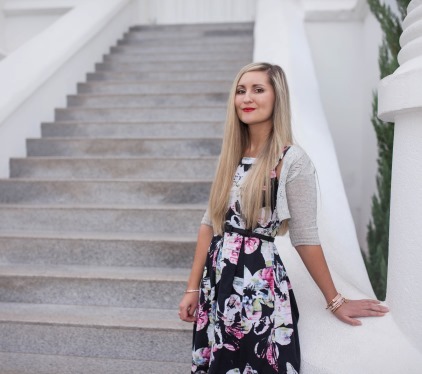
Sometimes I scare people with my enthusiasm for writing and
reading. People may say I need to get a social life. It'd be easier if my
fictional one wasn't so interesting. I have worked in the fiction-writing
industry for over eight years and have been editing stories for longer. I have
edited for both award-winning and best-selling authors and have worked on
manuscripts written for middle grade, young adult, and adult readers. Today I
work as a freelance editor, and you can find my editing services here: https://www.fawkesediting.com/ I also run an
award-winning writing tip blog: https://www.septembercfawkes.com/
Find me on Facebook:
https://www.facebook.com/profile.php?...
Twitter: https://twitter.com/SeptCFawkes
Tumblr: https://septembercfawkes.tumblr.com/
and Instagram: https://www.instagram.com/septcfawkes/
Photo credit: Lenny K Photography on Visualhunt / CC BY
The post How to Write Subtext appeared first on Elizabeth Spann Craig.
May 23, 2020
Twitterific Writing Links
by Elizabeth S. Craig, @elizabethscraig
Twitterific writing links are fed into the Writer’s Knowledge Base search engine (developed by writer and software engineer Mike Fleming) which has over 56,000 free articles on writing related topics. It’s the search engine for writers.
Have you visited the WKB lately? Check out the new redesign where you can browse by category, and sign up for free writing articles, on topics you choose, delivered to your email inbox! Sign up for the Hiveword newsletter here.
I had a book release last week. :) A Body in the Attic, Myrtle Clover #16 is available now.
Business / Miscellaneous
Before You Hire an Editor, Do These 4 Things: @KPickett_Editor
What are the different types of novel editing? @LouiseHarnby
How to un-self-publish: can you remove a book from self-published channels if you want to do something else with it? @Roz_Morris
How many words per page in a Book on Amazon [Survey + Proof]? @DaveChesson
Conferences and Events / Miscellaneous
In Brussels, the European Prize for Literature Names Its 2020 Laureates: @Porter_Anderson @pubperspectives
New York Public Library's ‘Young Lions' Finalists Named: @Porter_Anderson @stephycha @jkbphillips @kileyreid @xuanjuliana @brywashing @pubperspectives
The Australian Book Industry Awards' Digital Show: Undaunted by COVID-19: @Porter_Anderson @pubperspectives
PEN America's Inaugural Freedom To Write Index: 238 Imprisoned Worldwide: @Porter_Anderson @PENamerica @SuzanneNossel @karinkarlekar @pubperspectives
Creativity and Inspiration / Goal setting
Bullet Journal Guidelines for Writing Goals: @wvancamp
Creativity and Inspiration / Inspiration
How to Have an Effective Novel Brainstorming Session: @laina_turner
Need a Creative Kick in the Pants? @AngelaAckerman
How To Stay Creative In Difficult Times: @markmcguinness @thecreativepenn
Capture your Creativity by Journaling: @cbramkamp @LiveWriteThrive
Creativity and Inspiration / Inspiration / Reading as Writers
Nancy Drew for Adults: Great Amateur Sleuth Series for Readers Over Twenty: by Karen White @CrimeReads
Five SFF Characters Seeking Redemption and Trying to Do Better: @jamesdnicoll @tordotcom
For Gothic Heroines, Haunted Houses Are Always Too Big: @Healey_Jane @lithub
The Functionality of Literary Felines: 5 SFF Cats We Love: @tjklune @tordotcom
Six Great Novels About Crime That Aren't Quite Crime Novels: @matosman @CrimeReads
Creativity and Inspiration / Productivity / Fitting in Writing
Taking the First Step Toward Your Writing—Every Day: @ShannaSwendson
Jump-Start Your Writing Project With 1000 Words of Summer: @HelloTheFuture @lifehacker
Creativity and Inspiration / Success
What Is Keeping You from the Writing Career You Want? @WritersCoach
Creativity and Inspiration / Writing Life
Staying Creative in Times of Stress: @jillkemerer
Rebecca Solnit on the Intersection of Activism and Writing: by V.V. Ganeshananthan and Whitney Terrell @lithub
7 Ways You Can Write for Change: @NinaAmir @WritersDigest
You Shouldn’t Worry About Getting Published If You Haven’t Started Writing: @MegDowell
Are We There Yet? How to Tell When Your Book Is Really Done: @writeabook
Stay Positive, and Write: @cinapelayo @LitReactor
How to Make Working from Home Work for You: @kevintumlinson @Draft2Digital
Don’t Stress Over Things You Can’t Control: @jamesscottbell
Stay Positive, and Write: @cinapelayo @LitReactor
A Creative Lesson From This Coronavirus Madness: @Peter_Rey_
Gratitude Journal: How to Calm Anxiety and Boost Your Immunity: @WritetoDone
Contrary to How it Seems, Humans Band Together During and After Disasters: @ArkadyMartine @tordotcom
What's Your Personal Story? @JamiGold
Writing and Life: @AuthorTracyRees @WomenWriters
Can I Write Novels Even if I Haven’t Had an Interesting Life? @TheRyanLanz @Larry_Kahaner
Take 5: 5 Ways Writing Can Help You Calm Down: @10minnovelist
Genres / Dystopian
How to Write Dystopian Fiction: 9 Core Ideas: @nownovel
Genres / Historical
Anachronisms Kill Historical Fiction – Here’s How To Stop Them: by Rebecca Langley @standoutbooks
Genres / Horror
10 Times Folk Horror Made Us Too Scared for a Country Walk: @JamesFerguson @HorrorDNA
Genres / Memoir
Before You Write Your Memoir: 10 Musts That Can't Go Ignored: @shaylaleeraquel
Genres / Mystery
Homicide Investigations: Dos and Don'ts: @LeeLofland
5 Things To Avoid When Writing About Cops: @LeeLofland
Genres / Non-Fiction
5 Tips for Adding Humor to a Self-Help Book: @amyfishwrites @WritersDigest
Genres / Romance
The Structure of a Love Story: @woodwardkaren
Romance Tropes to Avoid: @BrynDonovan
The Unexpectedly Subversive World of Romance Novels: by Helen Taylor @lithub
Promo / Ads
6 Costly Facebook Ad Mistakes and How to Fix Them: @charlielawrance @SMExaminer
Promo / Book Reviews
3 Reasons to Embrace One-Star Reader Reviews: @sandrabeckwith @IndieReader
Promo / Book Signings and Launch parties
4 Ideas For A Pandemic Book Launch: @aprildavila
Promo / Miscellaneous
6 Things You Should Do After Networking: @dkparsonswriter @SelfPubForm
Using the Kindle Notes Feature on Goodreads as an Author:
Book Launch Tips for Authors: @KarenHWhiting @EdieMelson
8 Digital Marketing Tips for Authors: @FauziaBurke
Promo / Platforms
Tips for building an author brand: @DeborahJay2
Promo / Websites
How to Set up Your Author Website Quickly and Easily: @PaulineWiles
Publishing / Miscellaneous
Story as metaphor – talking to Ann Napolitano, author of Dear Edward: @Roz_Morris @napolitanoann @onestorymag
James Wood: What is at Stake When We Write Literary Criticism? by James Wood @lithub
Hachette USA Cancels Publication of Woody Allen Book, ‘After Listening': @Porter_Anderson @pubperspectives
20 Mind Destroying Secrets about Ghostwriting: @AmongTheZombies @LitReactor
5 Reasons Why Publishers Fail (and How to Avoid Them): @JohnDopp @IndieAuthorALLI
Amid ‘the ‘Low-Level Hum of Panic,' the UK's Young Writer Award Names Its Jury: @Porter_Anderson @pubperspectives @HoumanBarekat @KitdeWaal
Publishing's Challenges: Open Up New Channels Now: by Richard Charkin @pubperspectives
How to Put Together an Indie Author Anthology: @mattydalrymple @MarkLeslie @JaneFriedman
Recording an Audio Version of Your Story: by Chris Winkle
Publishing / News / International Publishing
Update: UK Publishers Association Tariffs Report Mistaken: @Porter_Anderson @pubperspectives
Simon de Jocas on Publishers Without Borders: A Way To Smile: @Porter_Anderson @pubperspectives @Bodour
France's Publishers Survey the Coronavirus' Damage: 72 Percent Plan Cutbacks: @Porter_Anderson @pubperspectives
Mapping Book and Publishing Policy in Africa and Latin America: @oliviasnaije @pubperspectives
Words Without Borders May: Cabo Verde on the ‘Geopolitical Chessboard': @Porter_Anderson @pubperspectives
Rights Roundup: Tracking Strong Sales in International Deals: @Porter_Anderson @pubperspectives
Digital Rights Trades: Brazilian Publishers Open an App With Matchmaking: @Porter_Anderson @pubperspectives
Kalem Agency's Şafak Tahmaz in Turkey: ‘Stay Alive, Connected, Sane': @Porter_Anderson @pubperspectives
Publishing / Options / Traditional Publishing / Querying
Literary Agents: 10 Quick Tips to Snaring a Good One: @Bpoelle @WritetoDone
What a Query Says About You: @BookEndsJessica
Organize your query's plot summary in a clear way (query critique): @NathanBransford
Publishing / Process / Book Design
Animate Your Cover Like a Pro (For Free): @C_ScottFrank
Publishing / Process / Services to Avoid
Writers, Don't Get Fleeced: @BE_Sanderson
Writing Craft / Beginnings
Which Type of Opening Works Best in a Novel? @Janice_Hardy
Writing Craft / Characters / Development
Tips for Building Characters: @AJHumpage
Writing Craft / Dialogue
He said, she said. 15 Keys to Writing Great Dialogue: @RuthHarrisBooks
6 Common Dialogue Mistakes: @davidfarland
Writing Craft / Endings
Writing your Final Chapter: 6 Dos and Don'ts For a Satisfying Conclusion: @annerallen
Writing Craft / Miscellaneous
Fictionalizing Your Story? Commit: @KPickett_Editor
Don't give your Readers a Reason to Reject Your Novel: @JodieRennerEd @annerallen
5 Writing Tips For Levelling Up Your Craft: @DaveChesson @DIYMFA
Story Elements: Give Them Purpose: @JamiGold
How to Define Your Character's Ghost: @kristen_kieffer
Five Plot Twists That Are Too Obvious: by Oren Ashkenazi @mythcreants
How Quickly Should Characters Adjust to a Disability? by Fay Onyx @mythcreants
What Is an Epilogue? 3 Steps to Writing a Good One: @JerryBJenkins
Learn the Rules So You Can Break Them, Explained: @SeptCFawkes
How to Write Perfect Twist Endings (That Will Shock and Delight Even Jaded Suspense Readers): @stephwrobel @CrimeReads
How The 12-Week Year Can Help You Write Your Novel: @WriteNowCoach
Writing Craft / POV
5 Questions About How to Balance Multiple POVs in Your Story: @KMWeiland
Writing Craft / Pre-Writing / Naming
How to choose a book title: @NathanBransford
Writing Craft / Pre-Writing / Research
Blood for Money: The Origins of the Mercenary: by B.K. Bass @mythicscribes
Writing Craft / Punctuation and Grammar
“Cancelled” Is Canceled: by John Mayer @The_Millions
Writing Craft / Revision
Quick and Tidy Tips to Streamline Editing: @GinaArdito @TheIWSG
Writing Craft / Scenes
Deborah Chester: How to Structure a Scene: @woodwardkaren
Writing Craft / Series
Putting Cliffhangers in a Series: @cyallowitz
Writing Craft / Settings and Description
How to Make Your Descriptions Less Boring: by Bucket Siler
Establish Vivid Settings Without Slowing Your Plot: @WorldOfVindor
Creating Authentic Details: Food: @PJTAuthor @DIYMFA
Architecture in Fiction—It's More Than Just a Setting: @SuzanneRedfearn @CrimeReads
3 Steps to Write Story Setting into the Action: @ZoeMMcCarthy
Writing Craft / Subtext
Let's Talk About Subtext In Screenwriting: @marksevi @CreativeScreen
Writing Craft / Voice
10 Ways to Develop Your Writer’s Voice: @woodwardkaren
Writing Tools / Apps
Scrivener Software Review: @cawcarrow
5 Self-Publishing Tools That Will Boost Your Author Career: @DaveChesson @Draft2Digital
Writing Tools / Miscellaneous
11 Small Writing Exercises That Can Still Improve Your Writing Skills: @MegDowell
Writing Tools / Resources
A Collection of 98 Free Online Writing Courses and Tools to Hone Your Skills: @couponchief
The Top Writing Links From Last Week Are On Twitterific:
Click To Tweet
The post Twitterific Writing Links appeared first on Elizabeth Spann Craig.
May 17, 2020
Using the Kindle Notes Feature on Goodreads as an Author
by Elizabeth S. Craig, @elizabethscraig
At some point last fall, I realized I was getting emails from Goodreads about authors' notes on books that I'd read (and noted on my Goodreads account). I clicked over from all the emails…partly because I was interested to read what they'd written about their stories, and partly because I wanted to learn more about the Goodreads feature.
This may be a feature that's totally evident to most writers, but it wasn't to me because I just don't use the Kindle notes feature. I do make marginalia in paperbacks and hardcovers I own, but I've never gotten into the habit of either reading or writing notes in the Kindle format, even though that's primarily how I'm reading books these days.
So this post is for those of you who're like me: not realizing you might be missing out on a fairly easy promo opportunity. Seeing these authors' notes reminded me that these authors had written books I'd enjoyed…and that they might have something new out. And I was actually about to release two books, and figured it might also remind my readers that I might have something new. Since I didn't find the process particularly intuitive (I rarely find Goodreads or Facebook intuitive), I'll share it here.
Here's what the emails to me looked like:
You can see Mary Beth Keane's notes at this link (I liked looking at an example. I also took a look at Colleen Hoover's.)
You might be a lot better at doing things on your phone than I am, but I went through this process solely on my laptop.
First, I opened up my last Myrtle book and skimmed through until I found a part I thought I'd comment on. I highlighted (by dragging my cursor) the sentences and a box popped up, giving me the option to make a note.
Which I did. :)

My Goodreads and my Amazon accounts are synched (and if yours aren't, they'll prompt you to do so). I added marked my book as “currently reading” and then a link appeared underneath the book to “view your notes and highlights.”
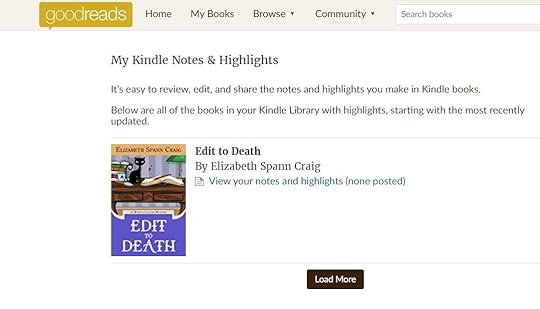
One feature that would be helpful for those of you who do use your notes and highlights on Kindle is the ability to choose what you wanted to share and what you didn't. The default is “off.”
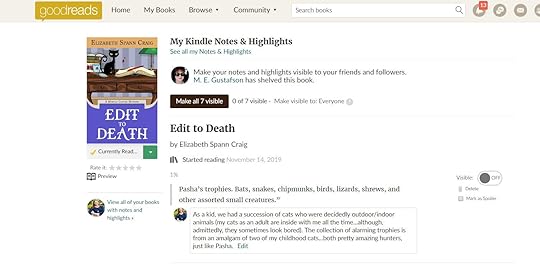
When I opened up the page the next day, I already had a nice message from a reader. :)

It's easy to make this process go especially quickly if you know what you might make notes of. Is there a regular setting in your series that's based on a place you grew up visiting? Is there a particular character based on a family member? If so, you can just do a search of the Kindle book and go right to that spot.
For more information on notes, see this page on Goodreads.
Do you make notes in your Kindle books? Have you ever used the notes feature on Kindle/Goodreads as an author?
Using the Kindle Notes Feature on Goodreads as an Author:
Click To Tweet
Photo on Visual hunt
The post Using the Kindle Notes Feature on Goodreads as an Author appeared first on Elizabeth Spann Craig.
May 16, 2020
Twitterific Writing Links
by Elizabeth S. Craig, @elizabethscraig
Twitterific writing links are fed into the Writer’s Knowledge Base search engine (developed by writer and software engineer Mike Fleming) which has over 50,000 free articles on writing related topics. It’s the search engine for writers.
Have you visited the WKB lately? Check out the new redesign where you can browse by category, and sign up for free writing articles, on topics you choose, delivered to your email inbox! Sign up for the Hiveword newsletter here.
New Stuff
Publisher and author L. Diane Wolfe has an affordable upcoming webinar: “How to Publish Your Book Now.” Sign up for part one here and part two here. Each session is $10.
Business / Miscellaneous
How to Calculate Series Read-Through (And Why It’s Important to Know): @DaveChesson
Finding the Right Freelancer To Work On Your Novel: @ReedsyHQ @TheIWSG
Writing Full-time: The Career Author: @JThorn_ @zachbohannon4 @thecreativepenn
The Comprehensive Guide to Finding, Hiring, and Working with an Editor: @chantel.hamilton @JaneFriedman
7 Ways Developmental Editing Elevates Your Work: @nownovel
Conferences and Events / Miscellaneous
At Davos 2020: IPA's Bodour Al Qasimi Leads Philanthropy Forum: @Porter_Anderson @IntPublishers @Bodour @pubperspectives
New York's BookExpo and ‘BookConline' Go Digital May 26 to 31: @Porter_Anderson @pubperspectives
Digital Bologna Book Fair: 60,000 Online Visitors, 75 Percent International: @Porter_Anderson @pubperspectives
A New Global Association of Literary Festivals: ‘A Resource To Share Knowledge': @Porter_Anderson @pubperspectives
US Writer Bryan Washington Wins Wales' £30,000 Dylan Thomas Prize: @Porter_Anderson @brywashing @dylanthomprize @pubperspectives
Creativity and Inspiration / First Novels
How To Write A Book: @petramatic @NPR
The Biggest Mistake New Novelists and Memoirists Make: @annerallen
How To Write A Book: 30 Different Authors Share Their Advice: @outwit_trade
Creativity and Inspiration / Goal setting
“Five Tricky Things I Have To Do To Achieve My Goals”: @10minnovelist
Creativity and Inspiration / Inspiration
Using pictures and music to inspire your writing: @Roz_Morris
Can a Poem a Day Make Us Better Writers? @annkroeker
Creativity and Inspiration / Inspiration / Reading as Writers
Celebrate Women In Horror All Year Long With Season-Specific Reading: @chris_shultz81 @LitReactor
7 Illustrated Novels for Adults: @_mariareva @ElectricLit
Five SFF Books With Dogs (and Dog-Adjacent Individuals) as Key Characters: @vfarmstrong
How to Find the Best Fiction Writing Exercises in Your Favorite Novel: @suelarkinsweems @write_practice
5 SFF Books Written by Afro-Caribbean Authors: @anndcardinal @tordotcom
8 Contemporary Novels by Japanese Women Writers: @ClaireClaire05 @ElectricLit
Need cheering up right now? Try reading a romance novel: @alisonflood @GuardianBooks
If you are having trouble reading… : @austinkleon
Creativity and Inspiration / Writing Life
5 Mistakes to Avoid if You Want to Finish Your Book: @colleen_m_story
Finding Focus in a Fractured World: @RLLaFevers @WriterUnboxed
12 Essential Tips for Writers On Surviving (and Avoiding) Burnout: @MegDowell
Why you should stop refreshing the news: @pubcoach
5 Ways to Integrate Tranquility Into Your Writing: @IndianaLee3 @DIYMFA
Writing About Addiction and Recovery: @carlson_bonnie @WomenWriters
Malcolm Gladwell: ‘It Takes 10,000 Hours To Become A Writer': by Brendan Brown @Bang2write
The Writer’s Life Is Not an Easy One: @losapala
Authors Share Their Writing Journeys—”What I did Right and What I Wish I had Done Differently”: @Kerrie_Flanagan @SKRViLL
A Three-Step Plan for Returning to a Partially Finished Manuscript: @Janice_Hardy
What's Holding You Back as a Writer? @KristinaAuthor
Genres / Fantasy
Fantasy Fortifications: Types of Castles: by Toni Šušnjar @mythicscribes
Epic Fantasy Tropes That Kinda Suck: @_HannahHeath
Genres / Horror
She’s Not Imagining Things: ‘The Invisible Man' and Horror’s History of Believing Women: @TheJulMarie @BDisgusting
Genres / Middle-Grade
Querying middle grade: @Janet_Reid
Genres / Mystery
Cozy Mystery Author Interview With| Jenna St James: @jennastjames15 @Ellen__Jacobson
The 12 Darkest Endings in the History of Noir Fiction: @zach_vasquez @CrimeReads
Genres / Picture Books
How to Write a Picture Book Query Letter in 6 Simple Steps: @ReedsyHQ
Genres / Romance
Creating a More Inclusive Romance Market: @TammyLoughAuthr @DIYMFA
Writing Confidently In A Genre With Stigma Attached: @Saganlives @thecreativepenn
Genres / Science Fiction
How much science does there need to be in Science Fiction? @pattyjansen
Writing Science Fiction with Science Resources: @AuthorSAT
Genres / Short Stories
How to Write Flash Fiction: @shaelinbishop @ReedsyHQ
Promo / Blogging
Author Blogging: 5 Reasons to Start and 3 Ways to Do It Right: by Brandon Cornett @JFbookman
How To Write On Medium and Be Successful: @shauntagrimes @BadRedheadMedia
Promo / Book Signings and Launch parties
How to Throw a Virtual Book Launch Party: by Michelle Anderstarr @IngramSpark
Promo / Images
Book Brush vs Canva: Which Design Tool is Better for Authors? by Rosie A. Point @DaveChesson
Promo / Miscellaneous
Book Launch Case Study: @rhymeswithbee @DanBlank
Five Things Learned Launching A Book During A Pandemic: @almakatsu @ChuckWendig
How to Market Your Book in Four Easy Steps (Part 2): @xtinakayebooks
4 Steps to Market Your Book (by @topshelfedits ): @xtinakayebooks
Will Your Novel Solve a Reader’s Problem? @Janice_Hardy @BadRedheadMedia
Book Promotion: Do This, Not That – BookBub: @KeriBarnum @JFbookman
Promo / Speaking
Tech Tips for Participating in a Remote Video Interview: @TtarcoJDC @PRHDigital
Publishing / Miscellaneous
Trump Administration Would ‘Eviscerate' Copyright, Say Industry Players: @Porter_Anderson @pubperspectives @kdroege @AdamMossoff @mattbarblan
Simon & Schuster CEO Carolyn Reidy Dies of a Heart Attack, 71: @Porter_Anderson @pubperspectives
AAP Honors Jeffrey Rosen With Its Public Service Award: @Porter_Anderson @pubperspectives @AmericanPublish
Wattpad's Verticalization: Now Making Its Own Adaptations: @Porter_Anderson @pubperspectives @wattpad
Publishing / News / International Publishing
Malaysia’s largest magazine publisher looked the other way as digital arrived. When Covid-19 arrived it paid the ultimate price: @thenewpubstd
Coronavirus: Italy's Literary Agents Form ADALI, Their First Association: @Porter_Anderson @pubperspectives
Coronavirus Resources: Frankfurter Buchmesse’s The Arts+ Opens a Way for Publishers to Pitch Their IP: @Porter_Anderson @pubperspectives @Book_Fair
Coronavirus Worklife: South Africa's Imagnary House Weathers Lockdown: @Porter_Anderson @pubperspectives
Coronavirus Notes: Events Going Digital, Spain's Readmagine Among Them: @Porter_Anderson @pubperspectives
Coronavirus Resources: The Netherlands' Letterenfonds Offers Additional Translation Support: @Porter_Anderson @pubperspectives
Coronavirus Impact: Europe's Aldus Report Reveals Book Fair Changes: @Porter_Anderson @pubperspectives
Coronavirus Impact: German Bookstores on the Early Reopening Trek: @Porter_Anderson @bbl_news @pubperspectives
Cambridge Opens an Essay Series, New Writings on the Pandemic: @Porter_Anderson @pubperspectives
Publishing / Options / Traditional Publishing / Pitches
How to pitch your novel in under a minute: from Let's Write Some Novels
Publishing / Options / Traditional Publishing / Querying
How to Find Your Agent in < 280 Characters: @AllisonAuthor @WritersDigest
5 Query Letter Mistakes: @victoria_grif7
Publishing / Options / Traditional Publishing / Rejections
10 Ways to Turn Rejection Into Acceptance: @brotzel_fiction @hopeclark
Publishing / Process / Formatting
How to Format Your Book with Vellum: @kristen_kieffer
Writing Craft / Characters / Development
19 Tools for Writing Great Characters: @PSHoffmanAuthor
Crafting Characters That Are Essential to Your Plot: @LiveWriteThrive
Writing Craft / Characters / Protagonists
Writing an Unlikable but Sympathetic Protagonist: @ADarkWhimsy @DIYMFA
6 Ways to Spotlight your Protagonist: @kcraftwriter @WriterUnboxed
Writing Craft / Flashback and Back Story
Backstory: Avoid Info Dumping by Making It Essential: @RomWriteLab @JamiGold
Writing Craft / Miscellaneous
Tips for Writing Action Scenes: by Mae Clair @StoryEmpire
How Do I Write From a Dazed Character’s Perspective? by Chris Winkle @mythcreants
Kevin Wilson's Rules for Writing the Absurd: @lithub
Writing Exercises for Exploring the Theme of Man and the Natural World: @Sara_HeartStory @DIYMFA
Understanding the Thematic Pendulum: @SeptCFawkes
Writing Tips for Retelling Shakespeare: From Atwood's Hag-Seed to Updike's Gertrude and Claudius: by Pat McKee @WritersDigest
Show, Don't Tell | what it means and how to use it: @shaelinbishop
7 Benefits of Writing Articles: @LindaGilden @EdieMelson
Writing Craft / Pacing
Book Recommendations For How To Write Strong Pacing: @WordNerdsVlog
Story Pacing: How Can We Ensure Our Pacing Is “Good”? @JamiGold
Writing Craft / Punctuation and Grammar
Top 10 Writing and Grammar Mistakes That Even Published Authors Make: @GrammarGirl
Why to avoid “ing” words in fiction: @Dwallacepeach
Don't fear repeating pronouns: @NathanBransford
5 Cases of Faulty Parenthesis: @writing_tips
Writing Craft / Revision
3 Reasons That “Perfectly Good Scene” Is Boring Your Readers: @Janice_Hardy
Writing Craft / Revisions / Critiques
Five things learned from writing groups: @elenikwriter @cbcbooks
Managing a Critique Group: @IWriteToo @RMFWriters
Writing Craft / Scenes
Scene Writing is Where the Fun Happens: @jamesscottbell
Writing Craft / Settings and Description
Coloring with Words: @EldredBird
Using The Five Senses: Taste: @JoanHallWrites @StoryEmpire
Writing Craft / Voice
Developing Your Writer's Voice: @woodwardkaren
Writing Tools / Apps
Tech Tips for Writers: 7 Google Apps Tricks Writers Should Know: @WordDreams
27 PC keyboard shortcuts for writing and editing in Word: @LouiseHarnby
Moving Things in Your Scrivener Binder: @aprildavila
Uncategorized
A little deus ex machina for writers this morning. (They would be useful for our current pandemic situation, too.)
The Top Writing Links From Last Week Are On Twitterific:
Click To Tweet
The post Twitterific Writing Links appeared first on Elizabeth Spann Craig.



